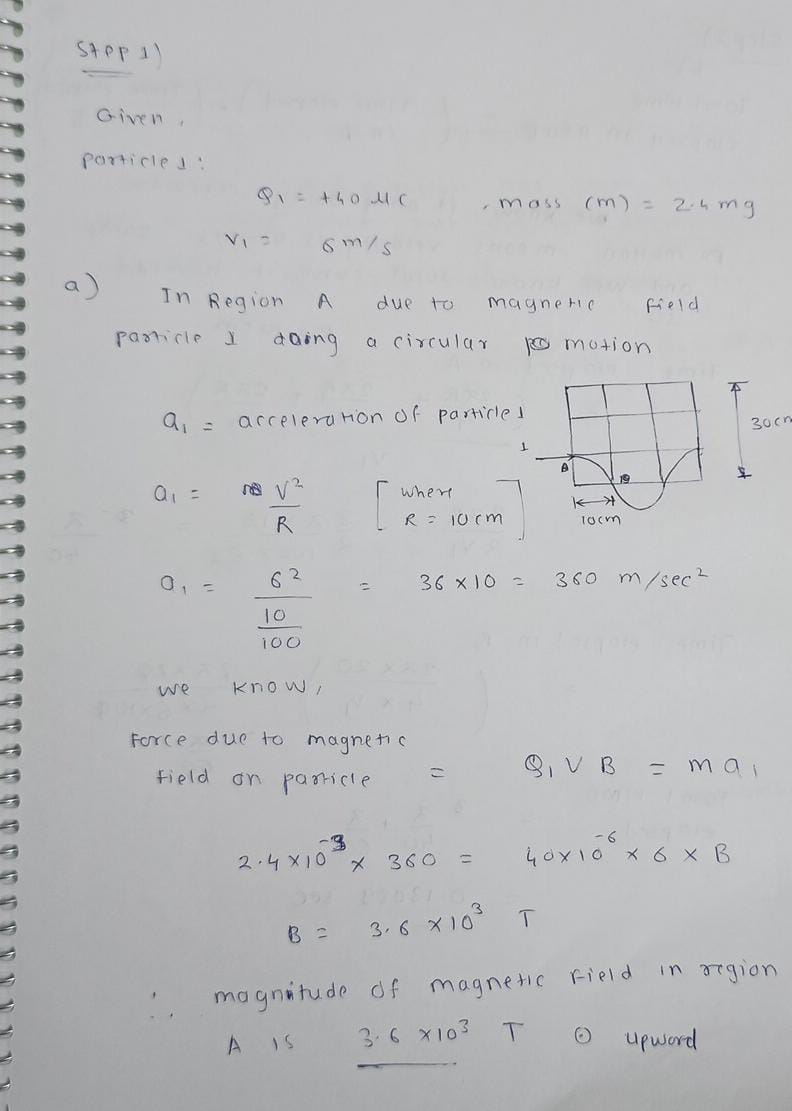Particle 1, the red line, has a charge of +40.0 microcoulombs and a mass of 2.40 milligrams. It also has a speed of 6.00 m/s when entering region A. The question is broken up into 3 parts. (a) If region A is a square measuring 30.0 cm on each side what is the magnitude of the magnetic field in region A? (in units of T) (b) From the instant particle 1 enters region A for the first time, until it leaves region B, how much time elapses? (answer in seconds) (c) If particle 2 (the blue line) has the same mass and speed as particle 1, what is the charge on particle 2? (answer in microcoulombs)
Particle 1, the red line, has a charge of +40.0 microcoulombs and a mass of 2.40 milligrams. It also has a speed of 6.00 m/s when entering region A. The question is broken up into 3 parts. (a) If region A is a square measuring 30.0 cm on each side what is the magnitude of the magnetic field in region A? (in units of T) (b) From the instant particle 1 enters region A for the first time, until it leaves region B, how much time elapses? (answer in seconds) (c) If particle 2 (the blue line) has the same mass and speed as particle 1, what is the charge on particle 2? (answer in microcoulombs)
College Physics
11th Edition
ISBN:9781305952300
Author:Raymond A. Serway, Chris Vuille
Publisher:Raymond A. Serway, Chris Vuille
Chapter1: Units, Trigonometry. And Vectors
Section: Chapter Questions
Problem 1CQ: Estimate the order of magnitude of the length, in meters, of each of the following; (a) a mouse, (b)...
Related questions
Question
100%
This problem is based off of the image attached.
Particle 1, the red line, has a charge of +40.0 microcoulombs and a mass of 2.40 milligrams. It also has a speed of 6.00 m/s when entering region A. The question is broken up into 3 parts.
(a) If region A is a square measuring 30.0 cm on each side what is the magnitude of the magnetic field in region A? (in units of T)
(b) From the instant particle 1 enters region A for the first time, until it leaves region B, how much time elapses? (answer in seconds)
(c) If particle 2 (the blue line) has the same mass and speed as particle 1, what is the charge on particle 2? (answer in microcoulombs)
Thank you for the help! I appreciate it.

Transcribed Image Text:A
1
B
2
C
Expert Solution
Step 1

Step by step
Solved in 3 steps with 3 images

Knowledge Booster
Learn more about
Need a deep-dive on the concept behind this application? Look no further. Learn more about this topic, physics and related others by exploring similar questions and additional content below.Recommended textbooks for you

College Physics
Physics
ISBN:
9781305952300
Author:
Raymond A. Serway, Chris Vuille
Publisher:
Cengage Learning

University Physics (14th Edition)
Physics
ISBN:
9780133969290
Author:
Hugh D. Young, Roger A. Freedman
Publisher:
PEARSON

Introduction To Quantum Mechanics
Physics
ISBN:
9781107189638
Author:
Griffiths, David J., Schroeter, Darrell F.
Publisher:
Cambridge University Press

College Physics
Physics
ISBN:
9781305952300
Author:
Raymond A. Serway, Chris Vuille
Publisher:
Cengage Learning

University Physics (14th Edition)
Physics
ISBN:
9780133969290
Author:
Hugh D. Young, Roger A. Freedman
Publisher:
PEARSON

Introduction To Quantum Mechanics
Physics
ISBN:
9781107189638
Author:
Griffiths, David J., Schroeter, Darrell F.
Publisher:
Cambridge University Press

Physics for Scientists and Engineers
Physics
ISBN:
9781337553278
Author:
Raymond A. Serway, John W. Jewett
Publisher:
Cengage Learning

Lecture- Tutorials for Introductory Astronomy
Physics
ISBN:
9780321820464
Author:
Edward E. Prather, Tim P. Slater, Jeff P. Adams, Gina Brissenden
Publisher:
Addison-Wesley

College Physics: A Strategic Approach (4th Editio…
Physics
ISBN:
9780134609034
Author:
Randall D. Knight (Professor Emeritus), Brian Jones, Stuart Field
Publisher:
PEARSON